University Business Management 510: Treaty of Waitangi Case Study
VerifiedAdded on 2023/01/20
|20
|4494
|61
Case Study
AI Summary
This case study examines the implications of the Treaty of Waitangi on business management in New Zealand. It explores the roles of key stakeholders, including Maori tribes and the British Crown, and analyzes the treaty's relevance in today's business environment. The study identifies and explains the business objectives of Ngai Tahu Holdings, focusing on operational efficiency and business growth. It further investigates the impact of external factors on strategic planning, applying both quantitative and qualitative analytical tools to measure growth areas. The study aims to provide a comprehensive understanding of the treaty's influence on bi-cultural business practices, offering insights into the unique characteristics of Maori business and the challenges of strategic planning in a dynamic external environment.
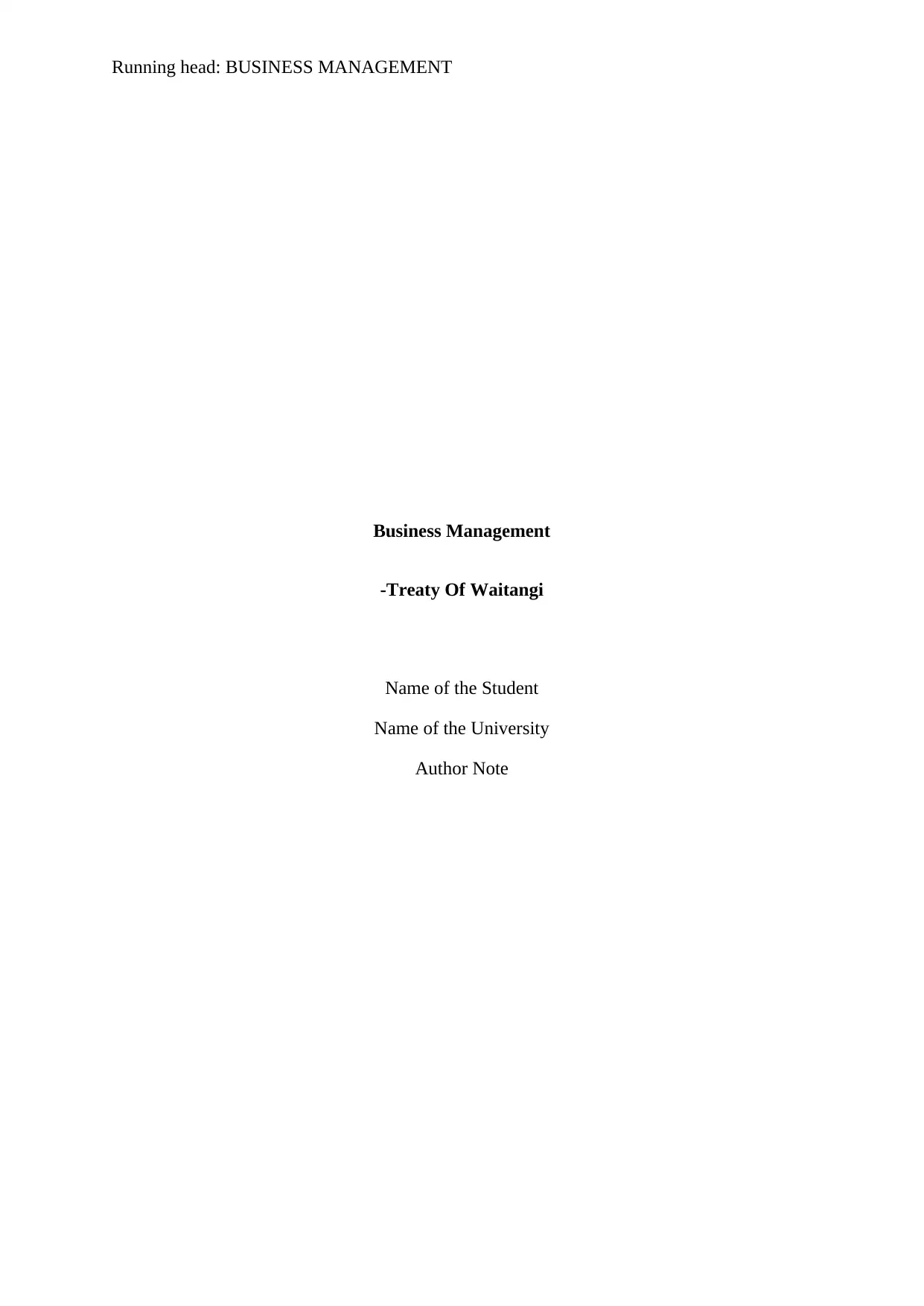
Running head: BUSINESS MANAGEMENT
Business Management
-Treaty Of Waitangi
Name of the Student
Name of the University
Author Note
Business Management
-Treaty Of Waitangi
Name of the Student
Name of the University
Author Note
Paraphrase This Document
Need a fresh take? Get an instant paraphrase of this document with our AI Paraphraser
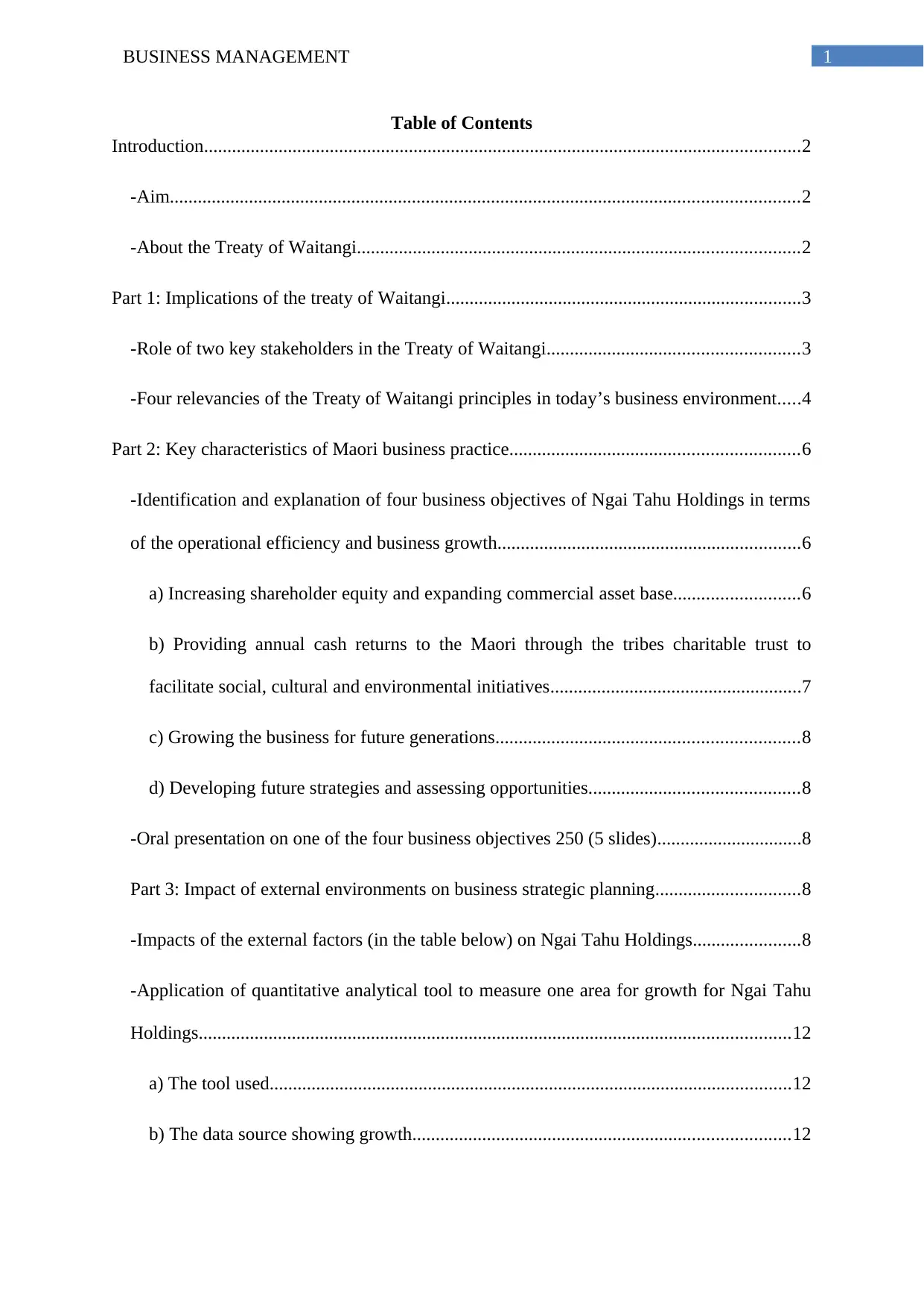
1BUSINESS MANAGEMENT
Table of Contents
Introduction................................................................................................................................2
-Aim.......................................................................................................................................2
-About the Treaty of Waitangi...............................................................................................2
Part 1: Implications of the treaty of Waitangi............................................................................3
-Role of two key stakeholders in the Treaty of Waitangi......................................................3
-Four relevancies of the Treaty of Waitangi principles in today’s business environment.....4
Part 2: Key characteristics of Maori business practice..............................................................6
-Identification and explanation of four business objectives of Ngai Tahu Holdings in terms
of the operational efficiency and business growth.................................................................6
a) Increasing shareholder equity and expanding commercial asset base...........................6
b) Providing annual cash returns to the Maori through the tribes charitable trust to
facilitate social, cultural and environmental initiatives......................................................7
c) Growing the business for future generations.................................................................8
d) Developing future strategies and assessing opportunities.............................................8
-Oral presentation on one of the four business objectives 250 (5 slides)...............................8
Part 3: Impact of external environments on business strategic planning...............................8
-Impacts of the external factors (in the table below) on Ngai Tahu Holdings.......................8
-Application of quantitative analytical tool to measure one area for growth for Ngai Tahu
Holdings...............................................................................................................................12
a) The tool used................................................................................................................12
b) The data source showing growth.................................................................................12
Table of Contents
Introduction................................................................................................................................2
-Aim.......................................................................................................................................2
-About the Treaty of Waitangi...............................................................................................2
Part 1: Implications of the treaty of Waitangi............................................................................3
-Role of two key stakeholders in the Treaty of Waitangi......................................................3
-Four relevancies of the Treaty of Waitangi principles in today’s business environment.....4
Part 2: Key characteristics of Maori business practice..............................................................6
-Identification and explanation of four business objectives of Ngai Tahu Holdings in terms
of the operational efficiency and business growth.................................................................6
a) Increasing shareholder equity and expanding commercial asset base...........................6
b) Providing annual cash returns to the Maori through the tribes charitable trust to
facilitate social, cultural and environmental initiatives......................................................7
c) Growing the business for future generations.................................................................8
d) Developing future strategies and assessing opportunities.............................................8
-Oral presentation on one of the four business objectives 250 (5 slides)...............................8
Part 3: Impact of external environments on business strategic planning...............................8
-Impacts of the external factors (in the table below) on Ngai Tahu Holdings.......................8
-Application of quantitative analytical tool to measure one area for growth for Ngai Tahu
Holdings...............................................................................................................................12
a) The tool used................................................................................................................12
b) The data source showing growth.................................................................................12
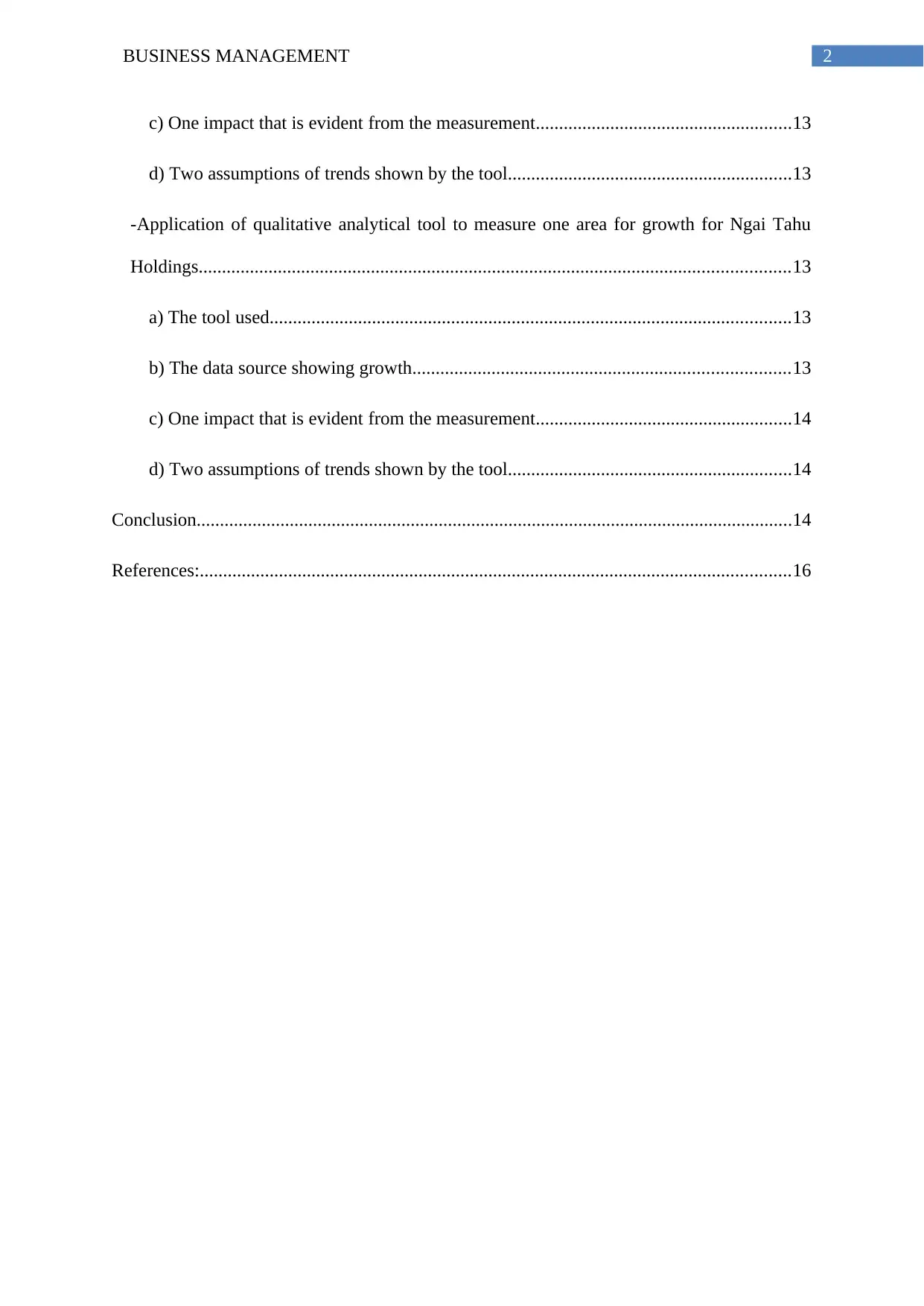
2BUSINESS MANAGEMENT
c) One impact that is evident from the measurement.......................................................13
d) Two assumptions of trends shown by the tool.............................................................13
-Application of qualitative analytical tool to measure one area for growth for Ngai Tahu
Holdings...............................................................................................................................13
a) The tool used................................................................................................................13
b) The data source showing growth.................................................................................13
c) One impact that is evident from the measurement.......................................................14
d) Two assumptions of trends shown by the tool.............................................................14
Conclusion................................................................................................................................14
References:...............................................................................................................................16
c) One impact that is evident from the measurement.......................................................13
d) Two assumptions of trends shown by the tool.............................................................13
-Application of qualitative analytical tool to measure one area for growth for Ngai Tahu
Holdings...............................................................................................................................13
a) The tool used................................................................................................................13
b) The data source showing growth.................................................................................13
c) One impact that is evident from the measurement.......................................................14
d) Two assumptions of trends shown by the tool.............................................................14
Conclusion................................................................................................................................14
References:...............................................................................................................................16
⊘ This is a preview!⊘
Do you want full access?
Subscribe today to unlock all pages.

Trusted by 1+ million students worldwide
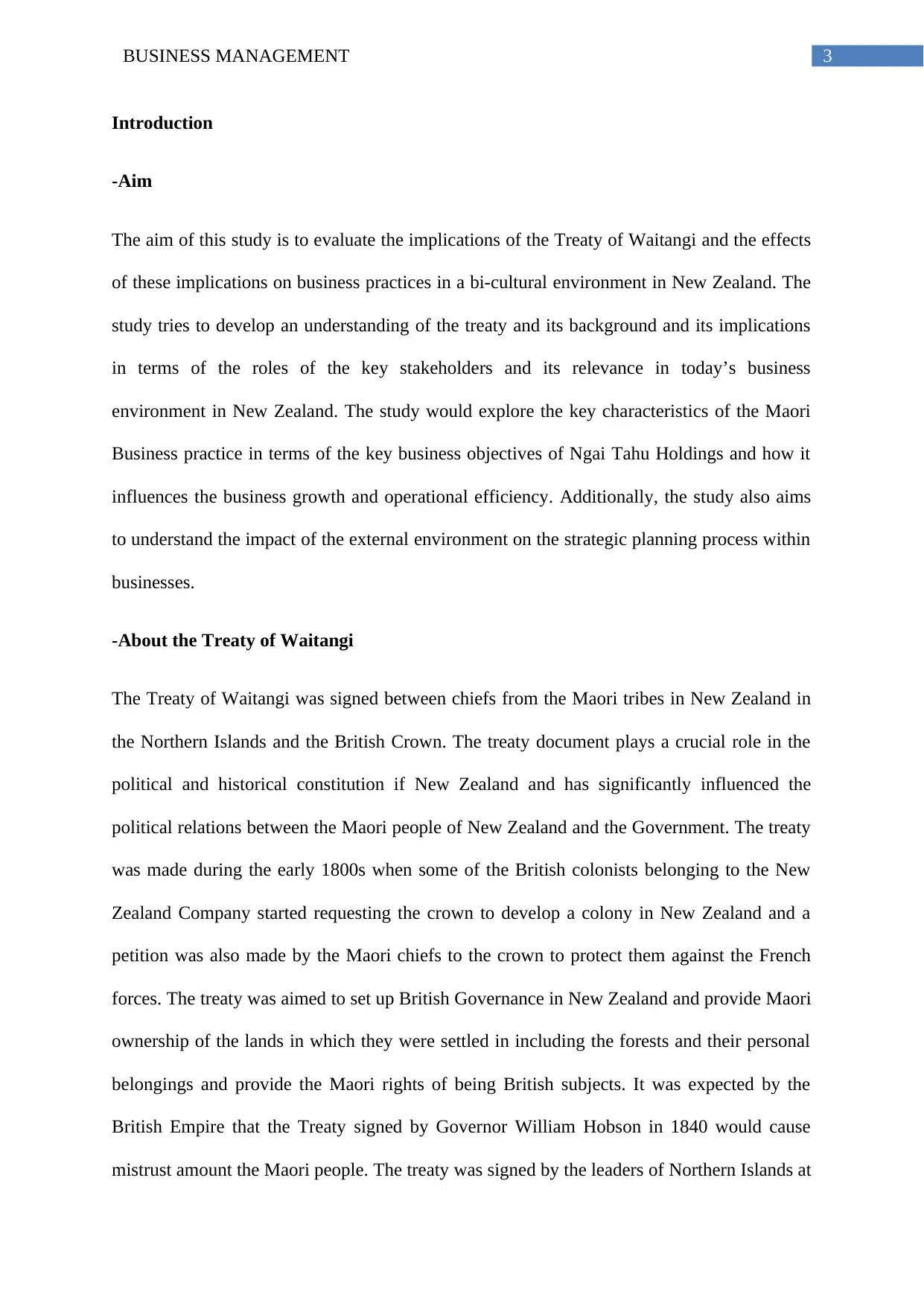
3BUSINESS MANAGEMENT
Introduction
-Aim
The aim of this study is to evaluate the implications of the Treaty of Waitangi and the effects
of these implications on business practices in a bi-cultural environment in New Zealand. The
study tries to develop an understanding of the treaty and its background and its implications
in terms of the roles of the key stakeholders and its relevance in today’s business
environment in New Zealand. The study would explore the key characteristics of the Maori
Business practice in terms of the key business objectives of Ngai Tahu Holdings and how it
influences the business growth and operational efficiency. Additionally, the study also aims
to understand the impact of the external environment on the strategic planning process within
businesses.
-About the Treaty of Waitangi
The Treaty of Waitangi was signed between chiefs from the Maori tribes in New Zealand in
the Northern Islands and the British Crown. The treaty document plays a crucial role in the
political and historical constitution if New Zealand and has significantly influenced the
political relations between the Maori people of New Zealand and the Government. The treaty
was made during the early 1800s when some of the British colonists belonging to the New
Zealand Company started requesting the crown to develop a colony in New Zealand and a
petition was also made by the Maori chiefs to the crown to protect them against the French
forces. The treaty was aimed to set up British Governance in New Zealand and provide Maori
ownership of the lands in which they were settled in including the forests and their personal
belongings and provide the Maori rights of being British subjects. It was expected by the
British Empire that the Treaty signed by Governor William Hobson in 1840 would cause
mistrust amount the Maori people. The treaty was signed by the leaders of Northern Islands at
Introduction
-Aim
The aim of this study is to evaluate the implications of the Treaty of Waitangi and the effects
of these implications on business practices in a bi-cultural environment in New Zealand. The
study tries to develop an understanding of the treaty and its background and its implications
in terms of the roles of the key stakeholders and its relevance in today’s business
environment in New Zealand. The study would explore the key characteristics of the Maori
Business practice in terms of the key business objectives of Ngai Tahu Holdings and how it
influences the business growth and operational efficiency. Additionally, the study also aims
to understand the impact of the external environment on the strategic planning process within
businesses.
-About the Treaty of Waitangi
The Treaty of Waitangi was signed between chiefs from the Maori tribes in New Zealand in
the Northern Islands and the British Crown. The treaty document plays a crucial role in the
political and historical constitution if New Zealand and has significantly influenced the
political relations between the Maori people of New Zealand and the Government. The treaty
was made during the early 1800s when some of the British colonists belonging to the New
Zealand Company started requesting the crown to develop a colony in New Zealand and a
petition was also made by the Maori chiefs to the crown to protect them against the French
forces. The treaty was aimed to set up British Governance in New Zealand and provide Maori
ownership of the lands in which they were settled in including the forests and their personal
belongings and provide the Maori rights of being British subjects. It was expected by the
British Empire that the Treaty signed by Governor William Hobson in 1840 would cause
mistrust amount the Maori people. The treaty was signed by the leaders of Northern Islands at
Paraphrase This Document
Need a fresh take? Get an instant paraphrase of this document with our AI Paraphraser
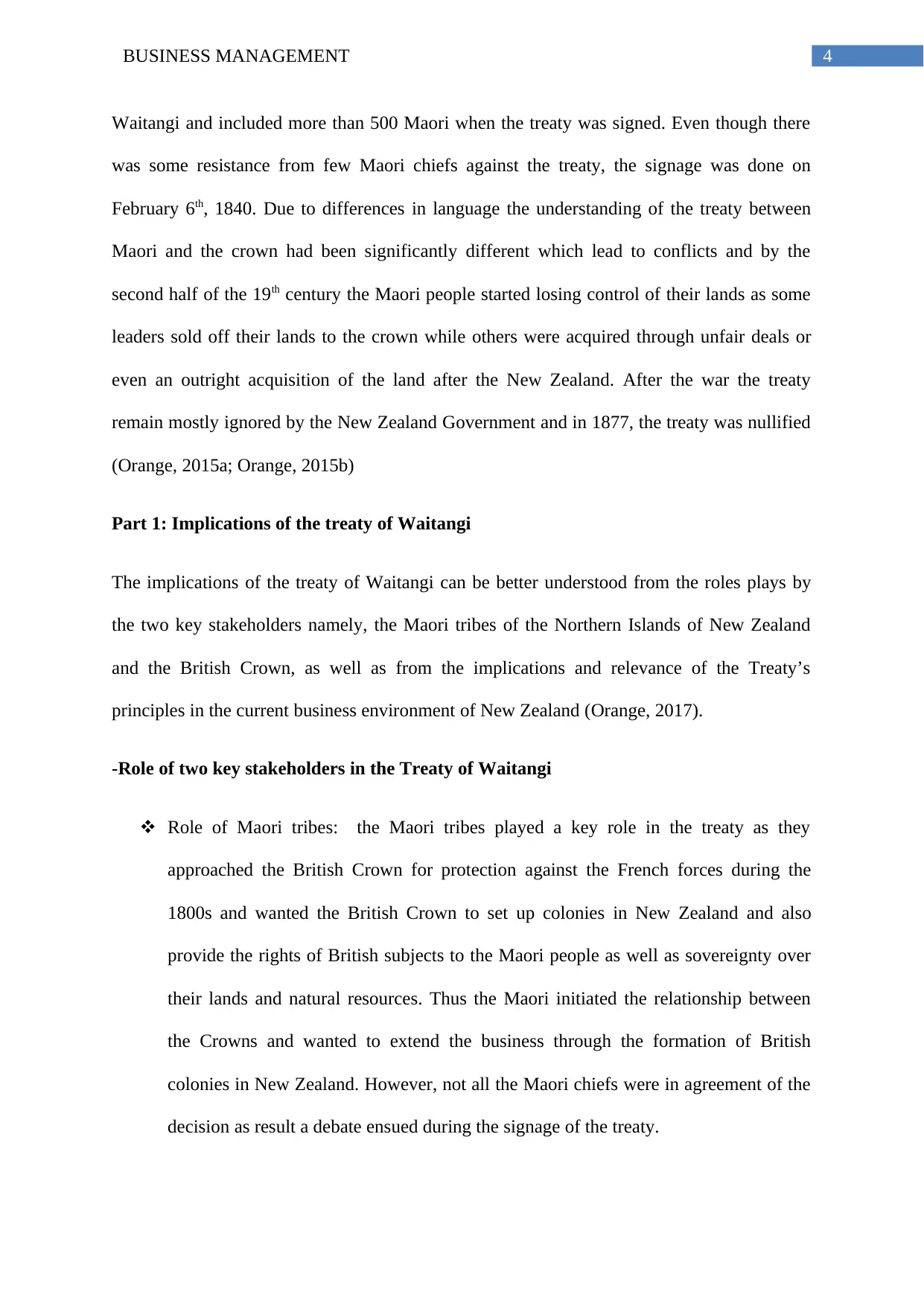
4BUSINESS MANAGEMENT
Waitangi and included more than 500 Maori when the treaty was signed. Even though there
was some resistance from few Maori chiefs against the treaty, the signage was done on
February 6th, 1840. Due to differences in language the understanding of the treaty between
Maori and the crown had been significantly different which lead to conflicts and by the
second half of the 19th century the Maori people started losing control of their lands as some
leaders sold off their lands to the crown while others were acquired through unfair deals or
even an outright acquisition of the land after the New Zealand. After the war the treaty
remain mostly ignored by the New Zealand Government and in 1877, the treaty was nullified
(Orange, 2015a; Orange, 2015b)
Part 1: Implications of the treaty of Waitangi
The implications of the treaty of Waitangi can be better understood from the roles plays by
the two key stakeholders namely, the Maori tribes of the Northern Islands of New Zealand
and the British Crown, as well as from the implications and relevance of the Treaty’s
principles in the current business environment of New Zealand (Orange, 2017).
-Role of two key stakeholders in the Treaty of Waitangi
Role of Maori tribes: the Maori tribes played a key role in the treaty as they
approached the British Crown for protection against the French forces during the
1800s and wanted the British Crown to set up colonies in New Zealand and also
provide the rights of British subjects to the Maori people as well as sovereignty over
their lands and natural resources. Thus the Maori initiated the relationship between
the Crowns and wanted to extend the business through the formation of British
colonies in New Zealand. However, not all the Maori chiefs were in agreement of the
decision as result a debate ensued during the signage of the treaty.
Waitangi and included more than 500 Maori when the treaty was signed. Even though there
was some resistance from few Maori chiefs against the treaty, the signage was done on
February 6th, 1840. Due to differences in language the understanding of the treaty between
Maori and the crown had been significantly different which lead to conflicts and by the
second half of the 19th century the Maori people started losing control of their lands as some
leaders sold off their lands to the crown while others were acquired through unfair deals or
even an outright acquisition of the land after the New Zealand. After the war the treaty
remain mostly ignored by the New Zealand Government and in 1877, the treaty was nullified
(Orange, 2015a; Orange, 2015b)
Part 1: Implications of the treaty of Waitangi
The implications of the treaty of Waitangi can be better understood from the roles plays by
the two key stakeholders namely, the Maori tribes of the Northern Islands of New Zealand
and the British Crown, as well as from the implications and relevance of the Treaty’s
principles in the current business environment of New Zealand (Orange, 2017).
-Role of two key stakeholders in the Treaty of Waitangi
Role of Maori tribes: the Maori tribes played a key role in the treaty as they
approached the British Crown for protection against the French forces during the
1800s and wanted the British Crown to set up colonies in New Zealand and also
provide the rights of British subjects to the Maori people as well as sovereignty over
their lands and natural resources. Thus the Maori initiated the relationship between
the Crowns and wanted to extend the business through the formation of British
colonies in New Zealand. However, not all the Maori chiefs were in agreement of the
decision as result a debate ensued during the signage of the treaty.
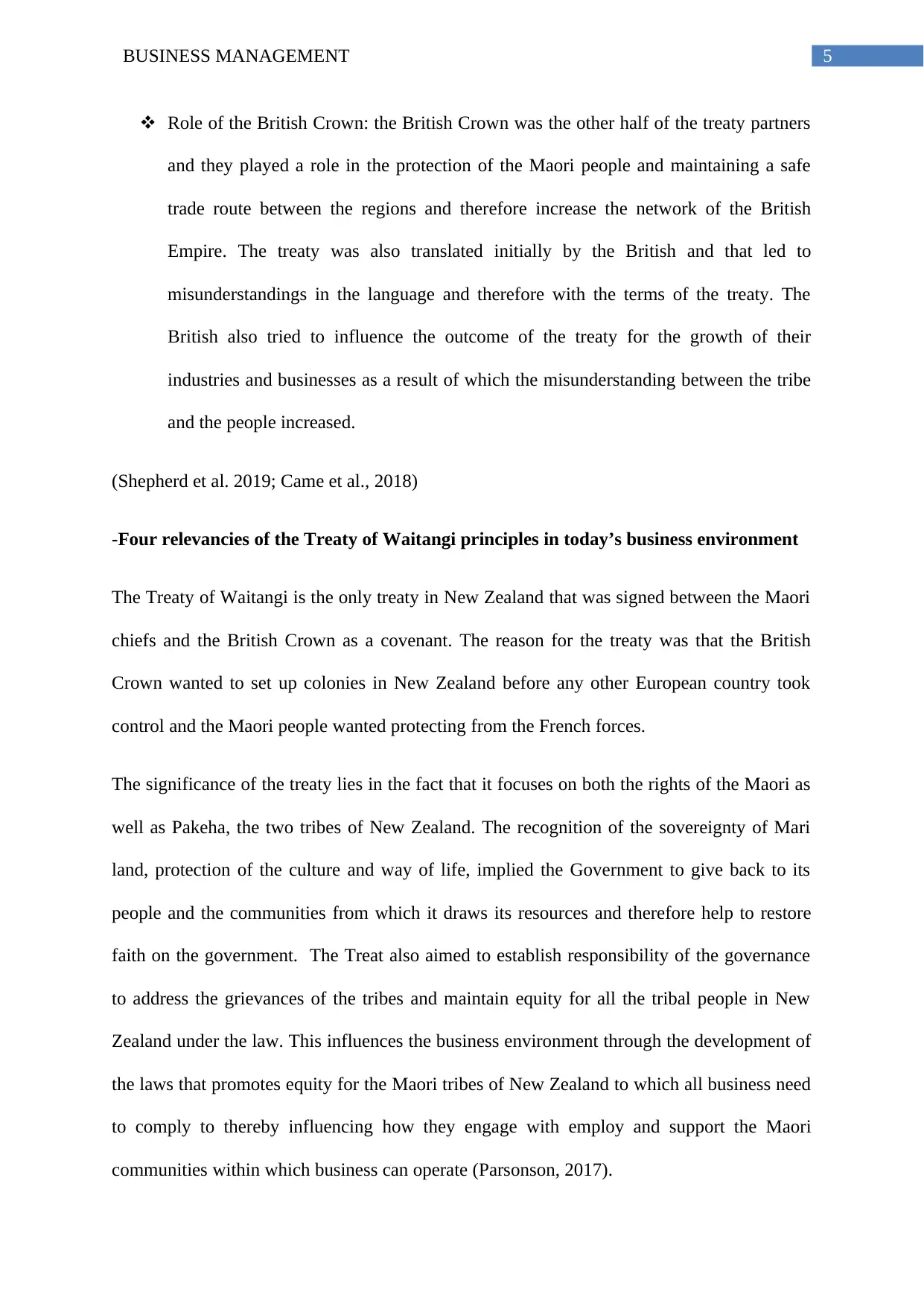
5BUSINESS MANAGEMENT
Role of the British Crown: the British Crown was the other half of the treaty partners
and they played a role in the protection of the Maori people and maintaining a safe
trade route between the regions and therefore increase the network of the British
Empire. The treaty was also translated initially by the British and that led to
misunderstandings in the language and therefore with the terms of the treaty. The
British also tried to influence the outcome of the treaty for the growth of their
industries and businesses as a result of which the misunderstanding between the tribe
and the people increased.
(Shepherd et al. 2019; Came et al., 2018)
-Four relevancies of the Treaty of Waitangi principles in today’s business environment
The Treaty of Waitangi is the only treaty in New Zealand that was signed between the Maori
chiefs and the British Crown as a covenant. The reason for the treaty was that the British
Crown wanted to set up colonies in New Zealand before any other European country took
control and the Maori people wanted protecting from the French forces.
The significance of the treaty lies in the fact that it focuses on both the rights of the Maori as
well as Pakeha, the two tribes of New Zealand. The recognition of the sovereignty of Mari
land, protection of the culture and way of life, implied the Government to give back to its
people and the communities from which it draws its resources and therefore help to restore
faith on the government. The Treat also aimed to establish responsibility of the governance
to address the grievances of the tribes and maintain equity for all the tribal people in New
Zealand under the law. This influences the business environment through the development of
the laws that promotes equity for the Maori tribes of New Zealand to which all business need
to comply to thereby influencing how they engage with employ and support the Maori
communities within which business can operate (Parsonson, 2017).
Role of the British Crown: the British Crown was the other half of the treaty partners
and they played a role in the protection of the Maori people and maintaining a safe
trade route between the regions and therefore increase the network of the British
Empire. The treaty was also translated initially by the British and that led to
misunderstandings in the language and therefore with the terms of the treaty. The
British also tried to influence the outcome of the treaty for the growth of their
industries and businesses as a result of which the misunderstanding between the tribe
and the people increased.
(Shepherd et al. 2019; Came et al., 2018)
-Four relevancies of the Treaty of Waitangi principles in today’s business environment
The Treaty of Waitangi is the only treaty in New Zealand that was signed between the Maori
chiefs and the British Crown as a covenant. The reason for the treaty was that the British
Crown wanted to set up colonies in New Zealand before any other European country took
control and the Maori people wanted protecting from the French forces.
The significance of the treaty lies in the fact that it focuses on both the rights of the Maori as
well as Pakeha, the two tribes of New Zealand. The recognition of the sovereignty of Mari
land, protection of the culture and way of life, implied the Government to give back to its
people and the communities from which it draws its resources and therefore help to restore
faith on the government. The Treat also aimed to establish responsibility of the governance
to address the grievances of the tribes and maintain equity for all the tribal people in New
Zealand under the law. This influences the business environment through the development of
the laws that promotes equity for the Maori tribes of New Zealand to which all business need
to comply to thereby influencing how they engage with employ and support the Maori
communities within which business can operate (Parsonson, 2017).
⊘ This is a preview!⊘
Do you want full access?
Subscribe today to unlock all pages.

Trusted by 1+ million students worldwide
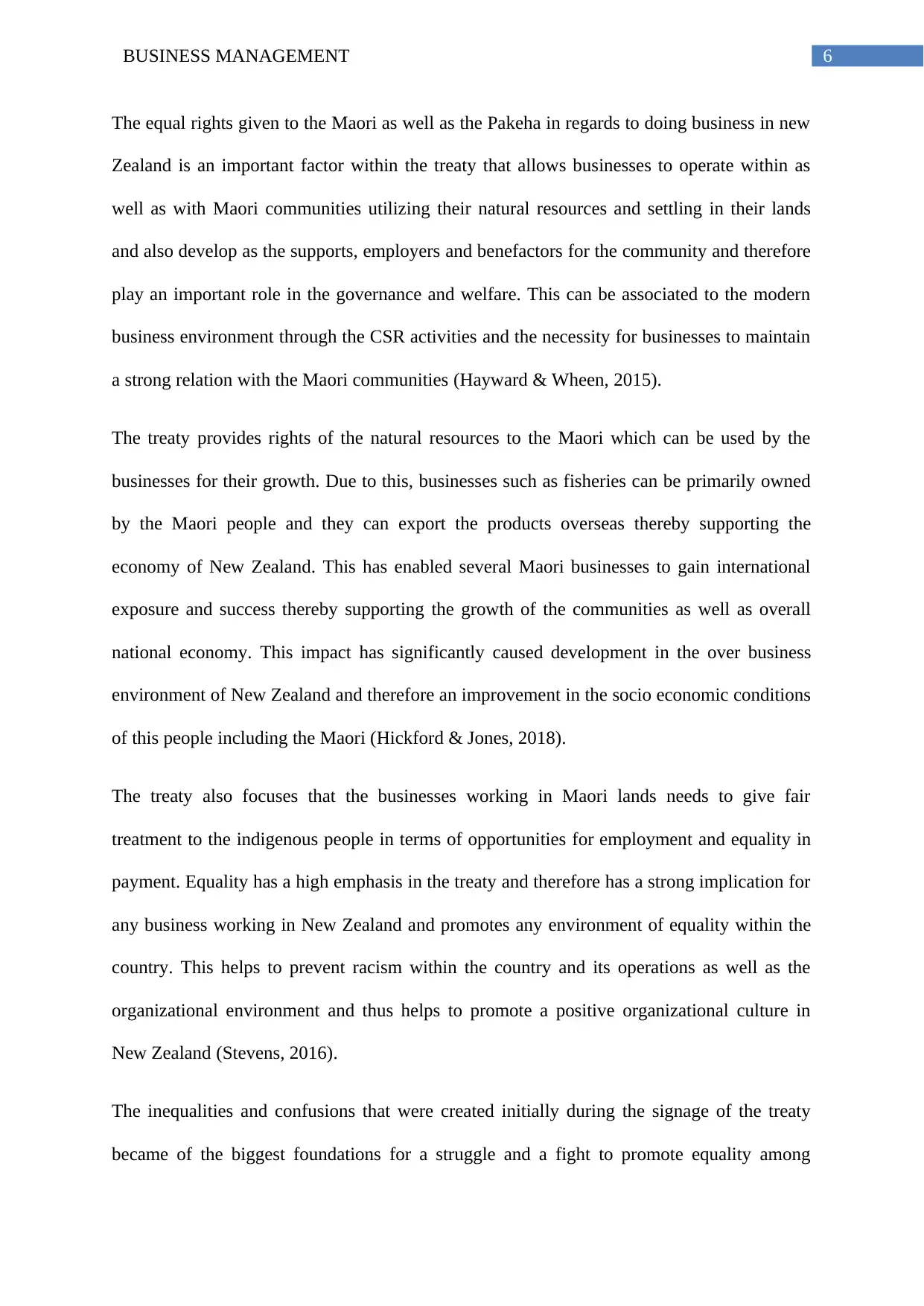
6BUSINESS MANAGEMENT
The equal rights given to the Maori as well as the Pakeha in regards to doing business in new
Zealand is an important factor within the treaty that allows businesses to operate within as
well as with Maori communities utilizing their natural resources and settling in their lands
and also develop as the supports, employers and benefactors for the community and therefore
play an important role in the governance and welfare. This can be associated to the modern
business environment through the CSR activities and the necessity for businesses to maintain
a strong relation with the Maori communities (Hayward & Wheen, 2015).
The treaty provides rights of the natural resources to the Maori which can be used by the
businesses for their growth. Due to this, businesses such as fisheries can be primarily owned
by the Maori people and they can export the products overseas thereby supporting the
economy of New Zealand. This has enabled several Maori businesses to gain international
exposure and success thereby supporting the growth of the communities as well as overall
national economy. This impact has significantly caused development in the over business
environment of New Zealand and therefore an improvement in the socio economic conditions
of this people including the Maori (Hickford & Jones, 2018).
The treaty also focuses that the businesses working in Maori lands needs to give fair
treatment to the indigenous people in terms of opportunities for employment and equality in
payment. Equality has a high emphasis in the treaty and therefore has a strong implication for
any business working in New Zealand and promotes any environment of equality within the
country. This helps to prevent racism within the country and its operations as well as the
organizational environment and thus helps to promote a positive organizational culture in
New Zealand (Stevens, 2016).
The inequalities and confusions that were created initially during the signage of the treaty
became of the biggest foundations for a struggle and a fight to promote equality among
The equal rights given to the Maori as well as the Pakeha in regards to doing business in new
Zealand is an important factor within the treaty that allows businesses to operate within as
well as with Maori communities utilizing their natural resources and settling in their lands
and also develop as the supports, employers and benefactors for the community and therefore
play an important role in the governance and welfare. This can be associated to the modern
business environment through the CSR activities and the necessity for businesses to maintain
a strong relation with the Maori communities (Hayward & Wheen, 2015).
The treaty provides rights of the natural resources to the Maori which can be used by the
businesses for their growth. Due to this, businesses such as fisheries can be primarily owned
by the Maori people and they can export the products overseas thereby supporting the
economy of New Zealand. This has enabled several Maori businesses to gain international
exposure and success thereby supporting the growth of the communities as well as overall
national economy. This impact has significantly caused development in the over business
environment of New Zealand and therefore an improvement in the socio economic conditions
of this people including the Maori (Hickford & Jones, 2018).
The treaty also focuses that the businesses working in Maori lands needs to give fair
treatment to the indigenous people in terms of opportunities for employment and equality in
payment. Equality has a high emphasis in the treaty and therefore has a strong implication for
any business working in New Zealand and promotes any environment of equality within the
country. This helps to prevent racism within the country and its operations as well as the
organizational environment and thus helps to promote a positive organizational culture in
New Zealand (Stevens, 2016).
The inequalities and confusions that were created initially during the signage of the treaty
became of the biggest foundations for a struggle and a fight to promote equality among
Paraphrase This Document
Need a fresh take? Get an instant paraphrase of this document with our AI Paraphraser
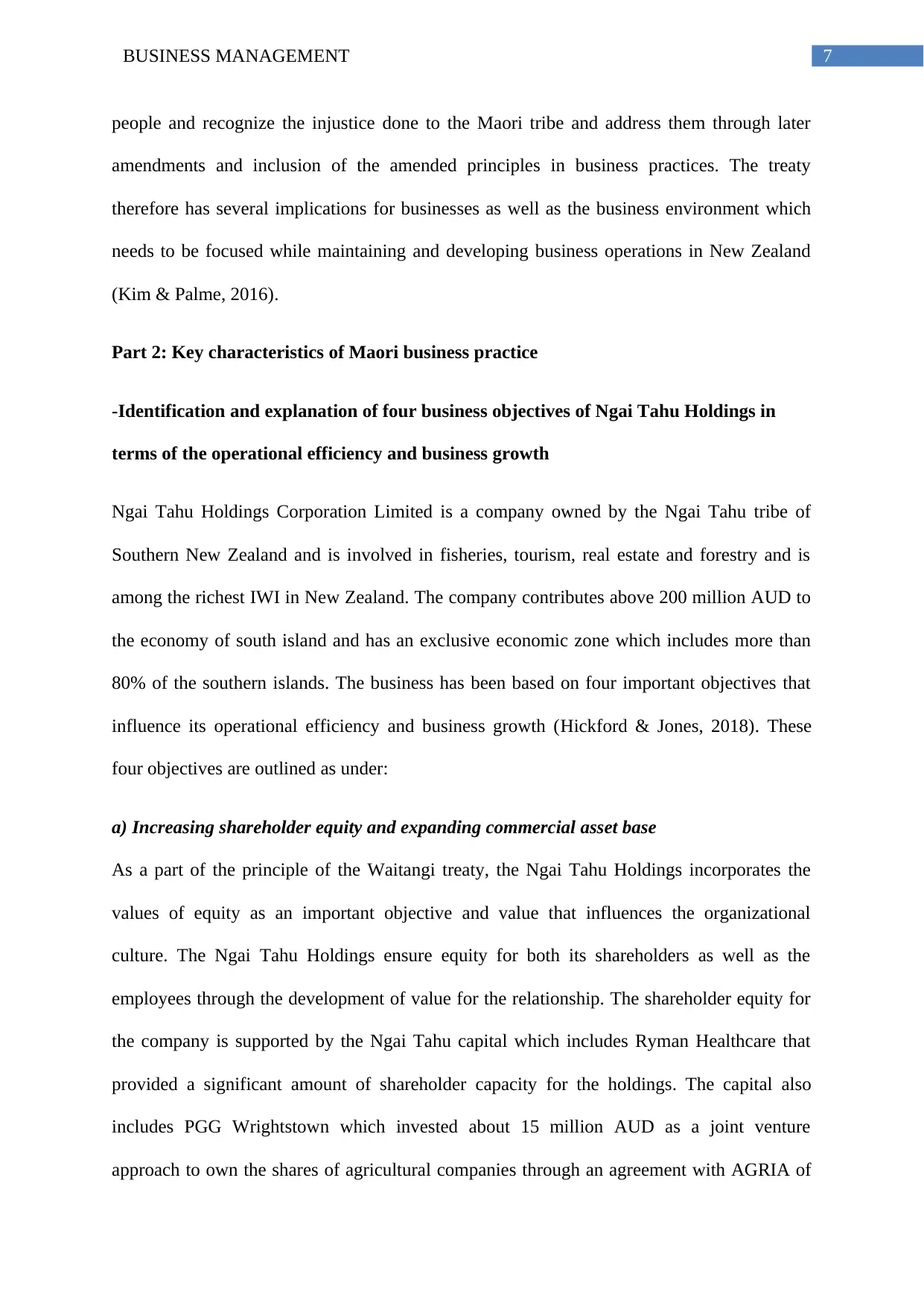
7BUSINESS MANAGEMENT
people and recognize the injustice done to the Maori tribe and address them through later
amendments and inclusion of the amended principles in business practices. The treaty
therefore has several implications for businesses as well as the business environment which
needs to be focused while maintaining and developing business operations in New Zealand
(Kim & Palme, 2016).
Part 2: Key characteristics of Maori business practice
-Identification and explanation of four business objectives of Ngai Tahu Holdings in
terms of the operational efficiency and business growth
Ngai Tahu Holdings Corporation Limited is a company owned by the Ngai Tahu tribe of
Southern New Zealand and is involved in fisheries, tourism, real estate and forestry and is
among the richest IWI in New Zealand. The company contributes above 200 million AUD to
the economy of south island and has an exclusive economic zone which includes more than
80% of the southern islands. The business has been based on four important objectives that
influence its operational efficiency and business growth (Hickford & Jones, 2018). These
four objectives are outlined as under:
a) Increasing shareholder equity and expanding commercial asset base
As a part of the principle of the Waitangi treaty, the Ngai Tahu Holdings incorporates the
values of equity as an important objective and value that influences the organizational
culture. The Ngai Tahu Holdings ensure equity for both its shareholders as well as the
employees through the development of value for the relationship. The shareholder equity for
the company is supported by the Ngai Tahu capital which includes Ryman Healthcare that
provided a significant amount of shareholder capacity for the holdings. The capital also
includes PGG Wrightstown which invested about 15 million AUD as a joint venture
approach to own the shares of agricultural companies through an agreement with AGRIA of
people and recognize the injustice done to the Maori tribe and address them through later
amendments and inclusion of the amended principles in business practices. The treaty
therefore has several implications for businesses as well as the business environment which
needs to be focused while maintaining and developing business operations in New Zealand
(Kim & Palme, 2016).
Part 2: Key characteristics of Maori business practice
-Identification and explanation of four business objectives of Ngai Tahu Holdings in
terms of the operational efficiency and business growth
Ngai Tahu Holdings Corporation Limited is a company owned by the Ngai Tahu tribe of
Southern New Zealand and is involved in fisheries, tourism, real estate and forestry and is
among the richest IWI in New Zealand. The company contributes above 200 million AUD to
the economy of south island and has an exclusive economic zone which includes more than
80% of the southern islands. The business has been based on four important objectives that
influence its operational efficiency and business growth (Hickford & Jones, 2018). These
four objectives are outlined as under:
a) Increasing shareholder equity and expanding commercial asset base
As a part of the principle of the Waitangi treaty, the Ngai Tahu Holdings incorporates the
values of equity as an important objective and value that influences the organizational
culture. The Ngai Tahu Holdings ensure equity for both its shareholders as well as the
employees through the development of value for the relationship. The shareholder equity for
the company is supported by the Ngai Tahu capital which includes Ryman Healthcare that
provided a significant amount of shareholder capacity for the holdings. The capital also
includes PGG Wrightstown which invested about 15 million AUD as a joint venture
approach to own the shares of agricultural companies through an agreement with AGRIA of
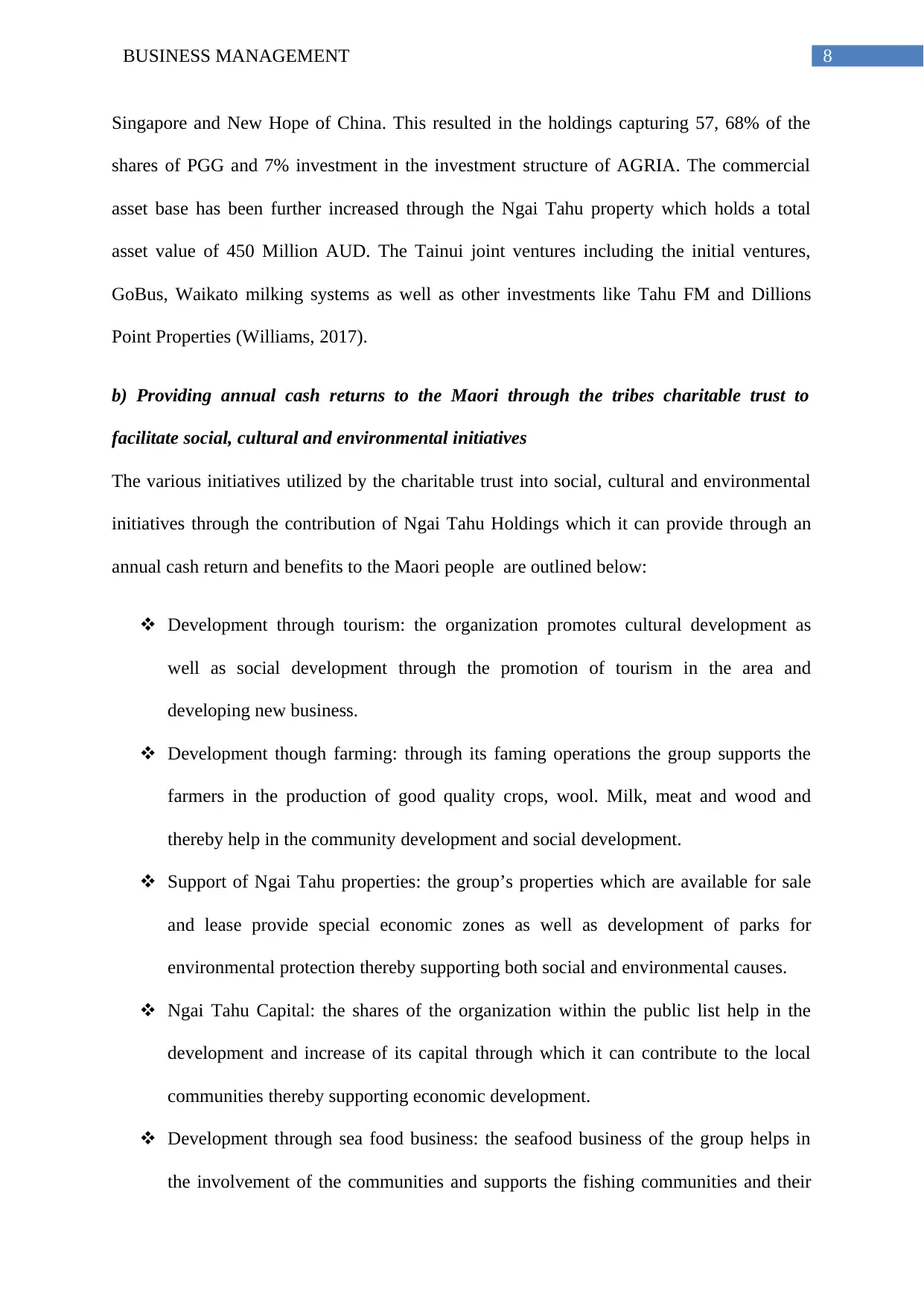
8BUSINESS MANAGEMENT
Singapore and New Hope of China. This resulted in the holdings capturing 57, 68% of the
shares of PGG and 7% investment in the investment structure of AGRIA. The commercial
asset base has been further increased through the Ngai Tahu property which holds a total
asset value of 450 Million AUD. The Tainui joint ventures including the initial ventures,
GoBus, Waikato milking systems as well as other investments like Tahu FM and Dillions
Point Properties (Williams, 2017).
b) Providing annual cash returns to the Maori through the tribes charitable trust to
facilitate social, cultural and environmental initiatives
The various initiatives utilized by the charitable trust into social, cultural and environmental
initiatives through the contribution of Ngai Tahu Holdings which it can provide through an
annual cash return and benefits to the Maori people are outlined below:
Development through tourism: the organization promotes cultural development as
well as social development through the promotion of tourism in the area and
developing new business.
Development though farming: through its faming operations the group supports the
farmers in the production of good quality crops, wool. Milk, meat and wood and
thereby help in the community development and social development.
Support of Ngai Tahu properties: the group’s properties which are available for sale
and lease provide special economic zones as well as development of parks for
environmental protection thereby supporting both social and environmental causes.
Ngai Tahu Capital: the shares of the organization within the public list help in the
development and increase of its capital through which it can contribute to the local
communities thereby supporting economic development.
Development through sea food business: the seafood business of the group helps in
the involvement of the communities and supports the fishing communities and their
Singapore and New Hope of China. This resulted in the holdings capturing 57, 68% of the
shares of PGG and 7% investment in the investment structure of AGRIA. The commercial
asset base has been further increased through the Ngai Tahu property which holds a total
asset value of 450 Million AUD. The Tainui joint ventures including the initial ventures,
GoBus, Waikato milking systems as well as other investments like Tahu FM and Dillions
Point Properties (Williams, 2017).
b) Providing annual cash returns to the Maori through the tribes charitable trust to
facilitate social, cultural and environmental initiatives
The various initiatives utilized by the charitable trust into social, cultural and environmental
initiatives through the contribution of Ngai Tahu Holdings which it can provide through an
annual cash return and benefits to the Maori people are outlined below:
Development through tourism: the organization promotes cultural development as
well as social development through the promotion of tourism in the area and
developing new business.
Development though farming: through its faming operations the group supports the
farmers in the production of good quality crops, wool. Milk, meat and wood and
thereby help in the community development and social development.
Support of Ngai Tahu properties: the group’s properties which are available for sale
and lease provide special economic zones as well as development of parks for
environmental protection thereby supporting both social and environmental causes.
Ngai Tahu Capital: the shares of the organization within the public list help in the
development and increase of its capital through which it can contribute to the local
communities thereby supporting economic development.
Development through sea food business: the seafood business of the group helps in
the involvement of the communities and supports the fishing communities and their
⊘ This is a preview!⊘
Do you want full access?
Subscribe today to unlock all pages.

Trusted by 1+ million students worldwide
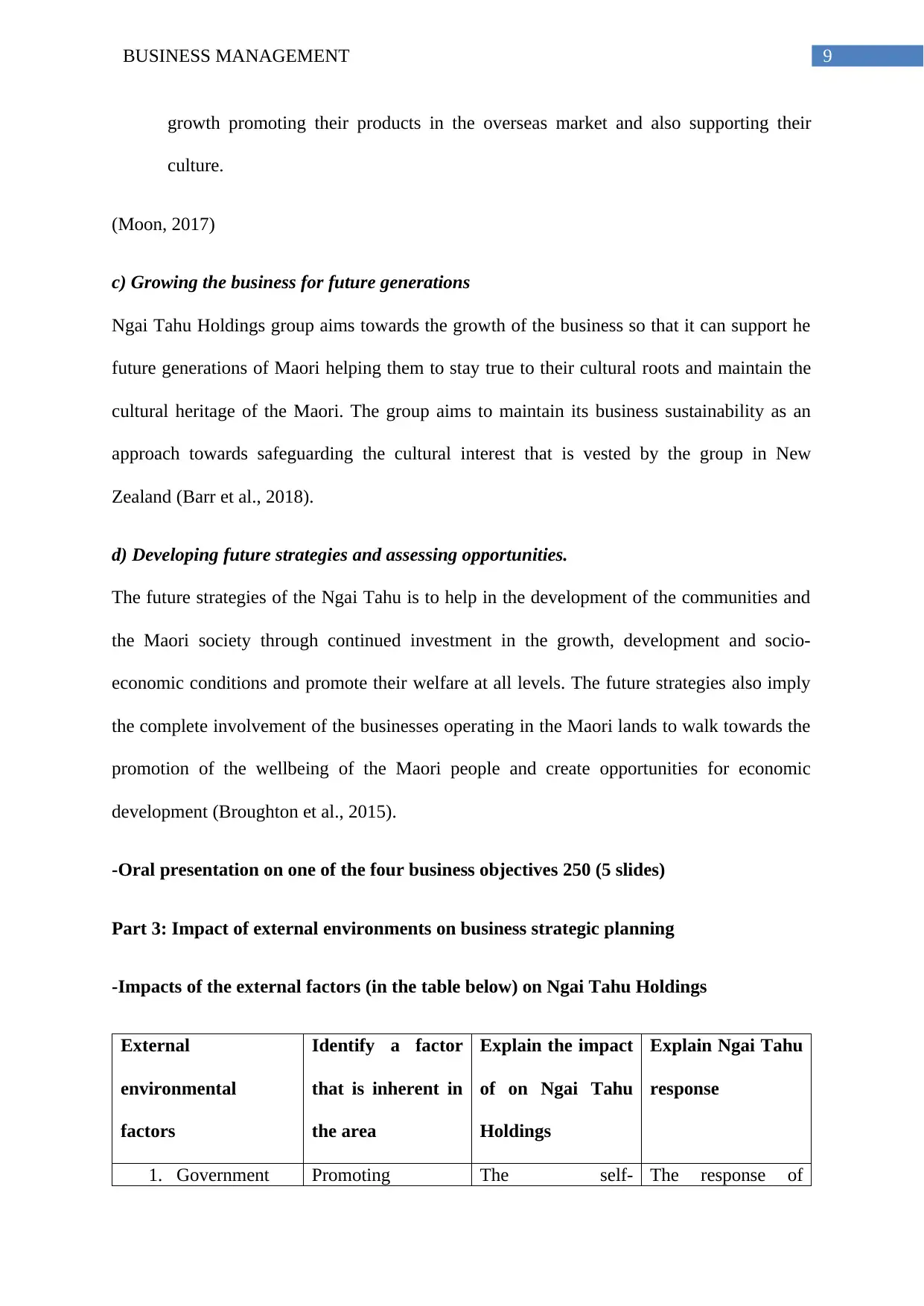
9BUSINESS MANAGEMENT
growth promoting their products in the overseas market and also supporting their
culture.
(Moon, 2017)
c) Growing the business for future generations
Ngai Tahu Holdings group aims towards the growth of the business so that it can support he
future generations of Maori helping them to stay true to their cultural roots and maintain the
cultural heritage of the Maori. The group aims to maintain its business sustainability as an
approach towards safeguarding the cultural interest that is vested by the group in New
Zealand (Barr et al., 2018).
d) Developing future strategies and assessing opportunities.
The future strategies of the Ngai Tahu is to help in the development of the communities and
the Maori society through continued investment in the growth, development and socio-
economic conditions and promote their welfare at all levels. The future strategies also imply
the complete involvement of the businesses operating in the Maori lands to walk towards the
promotion of the wellbeing of the Maori people and create opportunities for economic
development (Broughton et al., 2015).
-Oral presentation on one of the four business objectives 250 (5 slides)
Part 3: Impact of external environments on business strategic planning
-Impacts of the external factors (in the table below) on Ngai Tahu Holdings
External
environmental
factors
Identify a factor
that is inherent in
the area
Explain the impact
of on Ngai Tahu
Holdings
Explain Ngai Tahu
response
1. Government Promoting The self- The response of
growth promoting their products in the overseas market and also supporting their
culture.
(Moon, 2017)
c) Growing the business for future generations
Ngai Tahu Holdings group aims towards the growth of the business so that it can support he
future generations of Maori helping them to stay true to their cultural roots and maintain the
cultural heritage of the Maori. The group aims to maintain its business sustainability as an
approach towards safeguarding the cultural interest that is vested by the group in New
Zealand (Barr et al., 2018).
d) Developing future strategies and assessing opportunities.
The future strategies of the Ngai Tahu is to help in the development of the communities and
the Maori society through continued investment in the growth, development and socio-
economic conditions and promote their welfare at all levels. The future strategies also imply
the complete involvement of the businesses operating in the Maori lands to walk towards the
promotion of the wellbeing of the Maori people and create opportunities for economic
development (Broughton et al., 2015).
-Oral presentation on one of the four business objectives 250 (5 slides)
Part 3: Impact of external environments on business strategic planning
-Impacts of the external factors (in the table below) on Ngai Tahu Holdings
External
environmental
factors
Identify a factor
that is inherent in
the area
Explain the impact
of on Ngai Tahu
Holdings
Explain Ngai Tahu
response
1. Government Promoting The self- The response of
Paraphrase This Document
Need a fresh take? Get an instant paraphrase of this document with our AI Paraphraser
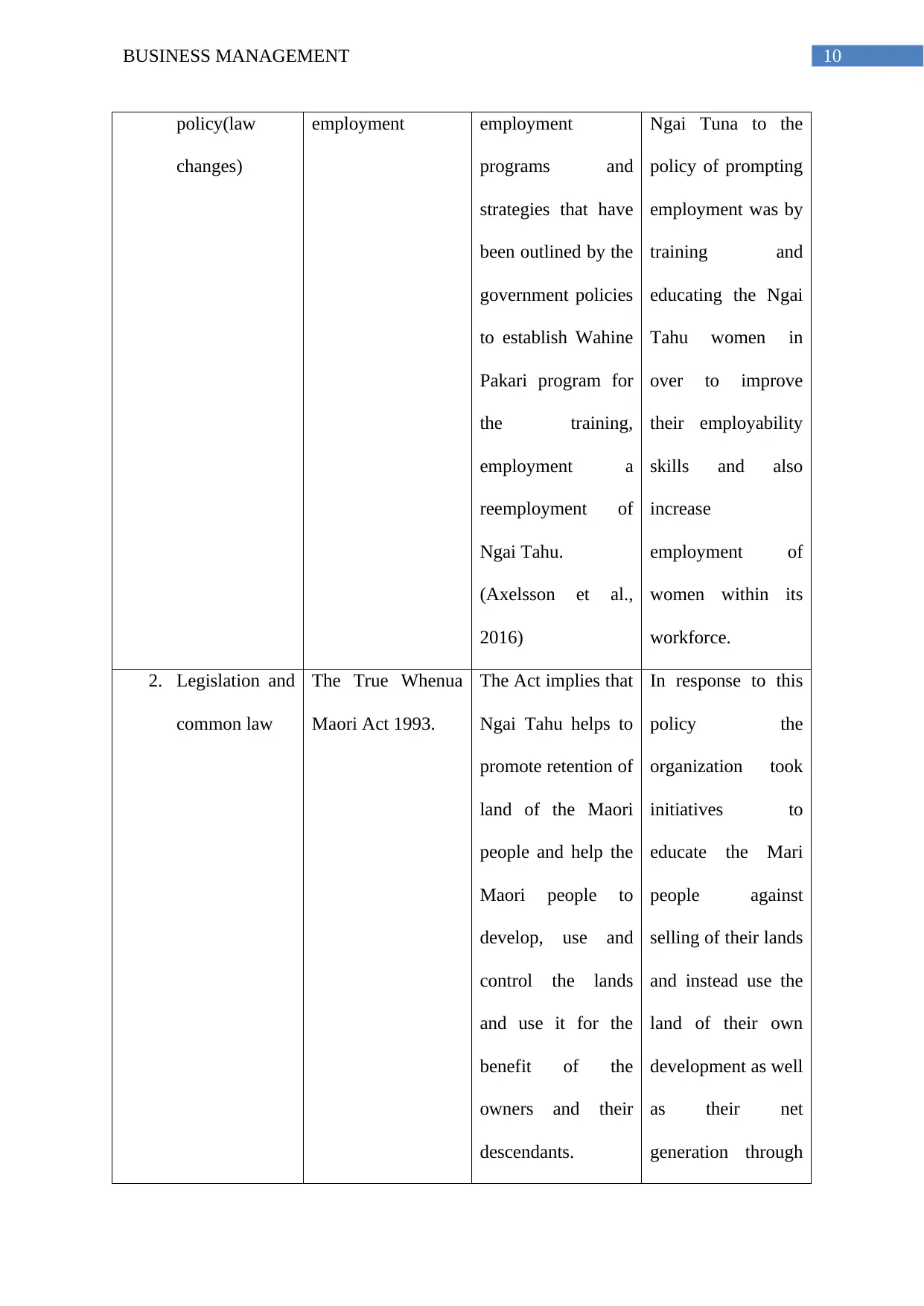
10BUSINESS MANAGEMENT
policy(law
changes)
employment employment
programs and
strategies that have
been outlined by the
government policies
to establish Wahine
Pakari program for
the training,
employment a
reemployment of
Ngai Tahu.
(Axelsson et al.,
2016)
Ngai Tuna to the
policy of prompting
employment was by
training and
educating the Ngai
Tahu women in
over to improve
their employability
skills and also
increase
employment of
women within its
workforce.
2. Legislation and
common law
The True Whenua
Maori Act 1993.
The Act implies that
Ngai Tahu helps to
promote retention of
land of the Maori
people and help the
Maori people to
develop, use and
control the lands
and use it for the
benefit of the
owners and their
descendants.
In response to this
policy the
organization took
initiatives to
educate the Mari
people against
selling of their lands
and instead use the
land of their own
development as well
as their net
generation through
policy(law
changes)
employment employment
programs and
strategies that have
been outlined by the
government policies
to establish Wahine
Pakari program for
the training,
employment a
reemployment of
Ngai Tahu.
(Axelsson et al.,
2016)
Ngai Tuna to the
policy of prompting
employment was by
training and
educating the Ngai
Tahu women in
over to improve
their employability
skills and also
increase
employment of
women within its
workforce.
2. Legislation and
common law
The True Whenua
Maori Act 1993.
The Act implies that
Ngai Tahu helps to
promote retention of
land of the Maori
people and help the
Maori people to
develop, use and
control the lands
and use it for the
benefit of the
owners and their
descendants.
In response to this
policy the
organization took
initiatives to
educate the Mari
people against
selling of their lands
and instead use the
land of their own
development as well
as their net
generation through
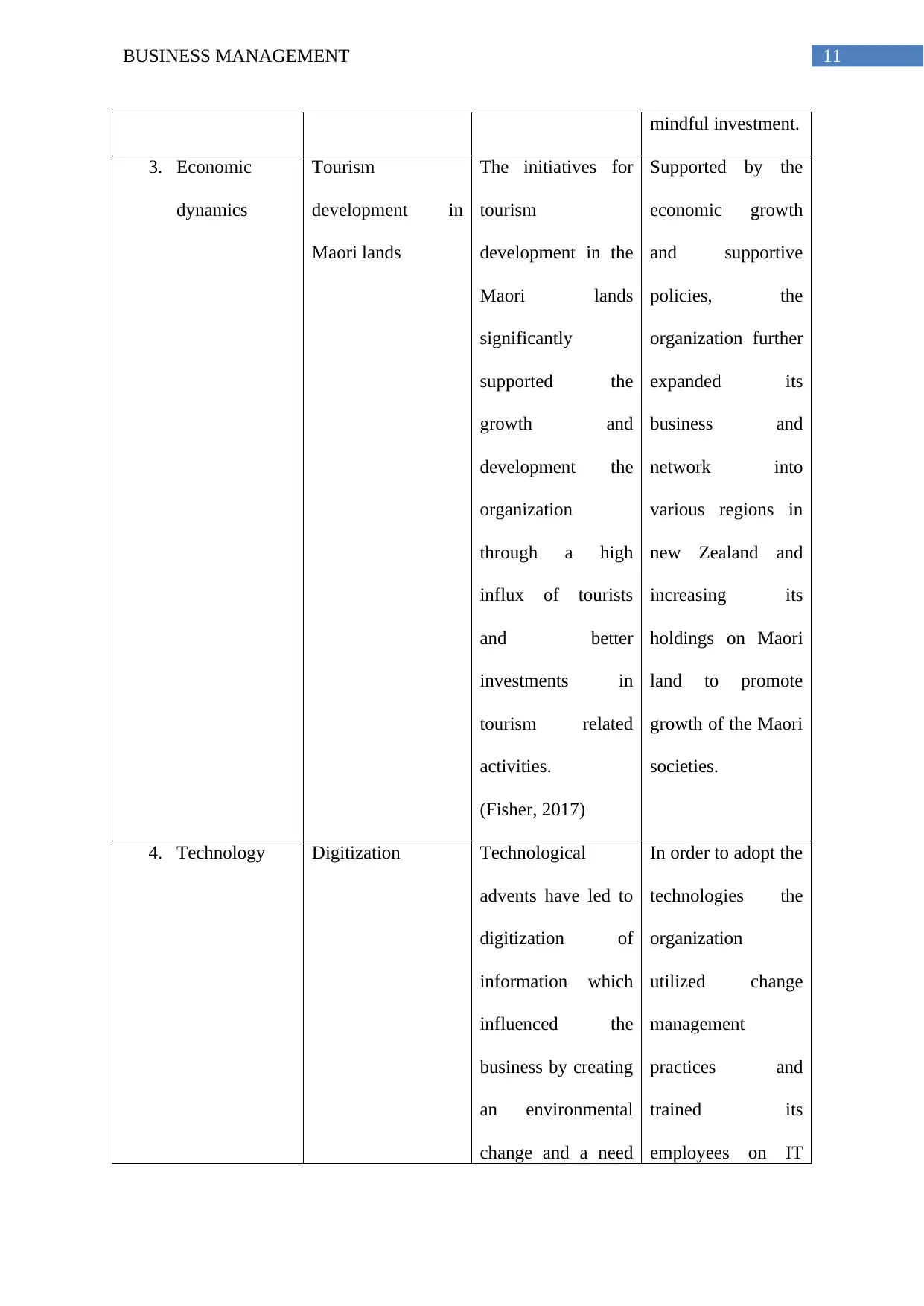
11BUSINESS MANAGEMENT
mindful investment.
3. Economic
dynamics
Tourism
development in
Maori lands
The initiatives for
tourism
development in the
Maori lands
significantly
supported the
growth and
development the
organization
through a high
influx of tourists
and better
investments in
tourism related
activities.
(Fisher, 2017)
Supported by the
economic growth
and supportive
policies, the
organization further
expanded its
business and
network into
various regions in
new Zealand and
increasing its
holdings on Maori
land to promote
growth of the Maori
societies.
4. Technology Digitization Technological
advents have led to
digitization of
information which
influenced the
business by creating
an environmental
change and a need
In order to adopt the
technologies the
organization
utilized change
management
practices and
trained its
employees on IT
mindful investment.
3. Economic
dynamics
Tourism
development in
Maori lands
The initiatives for
tourism
development in the
Maori lands
significantly
supported the
growth and
development the
organization
through a high
influx of tourists
and better
investments in
tourism related
activities.
(Fisher, 2017)
Supported by the
economic growth
and supportive
policies, the
organization further
expanded its
business and
network into
various regions in
new Zealand and
increasing its
holdings on Maori
land to promote
growth of the Maori
societies.
4. Technology Digitization Technological
advents have led to
digitization of
information which
influenced the
business by creating
an environmental
change and a need
In order to adopt the
technologies the
organization
utilized change
management
practices and
trained its
employees on IT
⊘ This is a preview!⊘
Do you want full access?
Subscribe today to unlock all pages.

Trusted by 1+ million students worldwide
1 out of 20
Related Documents
Your All-in-One AI-Powered Toolkit for Academic Success.
+13062052269
info@desklib.com
Available 24*7 on WhatsApp / Email
![[object Object]](/_next/static/media/star-bottom.7253800d.svg)
Unlock your academic potential
Copyright © 2020–2026 A2Z Services. All Rights Reserved. Developed and managed by ZUCOL.



